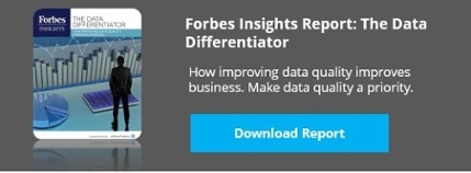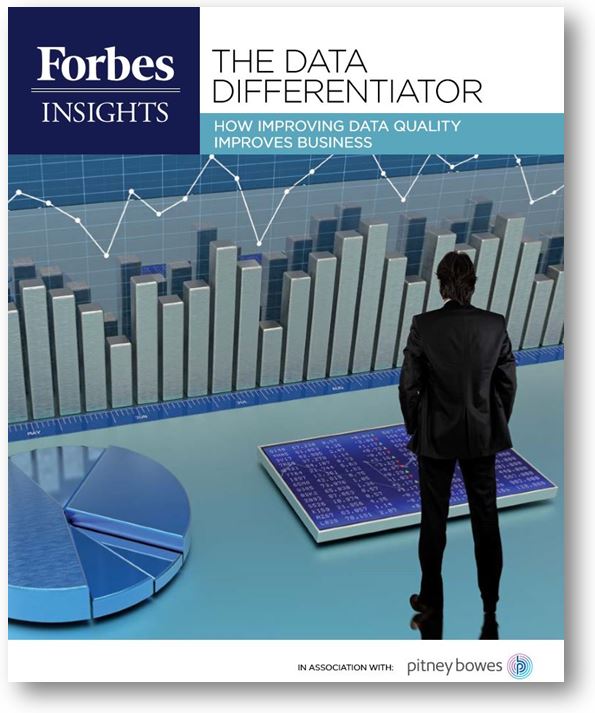Capitalize on Data
Press release issued by Forbes Corporate Communications; Ironside comments on how to capitalize on data
NEW YORK, May 31, 2017 — Corporate leaders consider data and analytics capability a top investment priority. Yet despite this, faith in the data businesses rely upon is low. According to the Forbes Insights and KPMG “2016 Global CEO Outlook,” 84% of CEOs are concerned about the quality of the data they’re basing their decisions on.
Forbes Insights, in association with Pitney Bowes released a report, “The Data Differentiator: How Improving Data Quality Improves Business“. They conducted in-depth research and interviewed industry experts, analysts and real-world users to explore the benefits of good-quality data and the costs of poor-quality data.
Interviewees include:
- Dun & Bradstreet: Setting the Stage
- Forrester: Beyond Transactional Data
- Ironside: Capitalizing on Data
Interviews suggest that confidence in data may be low for various reasons, including silos of information, difficulty in securing executive buy-in, not to mention the sheer quantity of legacy data a company may possess.
The costs of poor data are not solely financial; businesses can see loss of reputation, missed opportunities and higher-risk decision making as a result of low confidence in data.
However, regardless of the reasons for hesitancy on the data front, the fast pace of technological change and the competitive threat mean that organizations must quickly scale up capacity and integrate new sources of data—including unstructured sources like social media and messaging—as well as learn how to use the data they generate internally to improve product and service offerings, all while improving the quality of data accumulated over the life of the business.
“In its raw form, data can often be imperfect and incomplete, but with the right tools and processes, data can deliver true, rich insights to a business,” said Dan Adams, Vice President of Data Product Management at Pitney Bowes. “The good news is that more organizations are investing in data and technologies to improve and enrich data quality to improve outcomes, save money and make better business decisions.”
Benefits of good-quality data
- Decision making: The better the data quality, the more confidence users will have in the outputs they produce, lowering risk in the outcomes and increasing efficiency. The old “garbage in, garbage out,” adage is true, as is its inverse.
- Productivity: Good-quality data allows staff to be more productive. Instead of spending time validating and fixing data errors, they can focus on their core mission.
- Compliance: In industries where regulations govern relationships or trade with certain customers, especially in finance, maintaining good-quality data can be the difference between compliance and millions of dollars in fines. Compliance must be an ongoing focus as new regulations continue to evolve in regions around the world and wherever a company conducts business.
- Marketing: Better data enables more accurate targeting and communications, especially in the omnichannel environments many organizations are striving toward.
Costs of poor-quality data
- Reputational damage: This can range from small, everyday damage to large public relations disasters. On the larger end, poor data in banking, for example, could lead to inadvertent trade with sanctioned governments or suspected terrorist financiers if institutions don’t have accurate enough information about the customers they’re trading with, resulting in PR fallout on top of punitive fines.
- Missed opportunities: A company may miss a critical opportunity for new product development or customer need that a competitor with a more mature understanding of data may capitalize upon.
- Lost revenue: Poor data can lead to lost revenue in many ways—communications that fail to convert to sales because the underlying customer data is incorrect, for one example. In insurance, bad property information could cause revenue to be lost on premiums if they are set too low because of the data.
Download a full copy of the report – The Data Differentiator: How Improving Data Quality Improves Business

About Forbes Insights
Forbes Insights is the strategic research and thought leadership practice of Forbes Media. By leveraging proprietary databases of senior-level executives in the Forbes community, Forbes Insights conducts research on a wide range of topics to position brands as thought leaders and drive stakeholder engagement.
About Pitney Bowes
Pitney Bowes (NYSE: PBI), is a global technology company powering billions of transactions – physical and digital – in the connected and borderless world of commerce. Clients around the world, including 90 percent of the Fortune 500, rely on products, solutions, services and data from Pitney Bowes in the areas of customer information management, location intelligence, customer engagement, shipping, mailing, and global ecommerce. And with the innovative Pitney Bowes Commerce Cloud, clients can access the broad range of Pitney Bowes solutions, analytics, and APIs to drive commerce.






